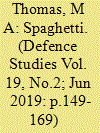| Srl | Item |
| 1 |
ID:
188292


|
|
|
|
|
| Summary/Abstract |
Some discussions of cyberattacks paint them broadly as low cost and widely available, failing to distinguish cyberattacks by difficulty. However, as the literature has long recognized, cyberattacks are not all alike. The most sophisticated attacks require greater capabilities, including noncyber capabilities, that are commanded by only by a handful of states. Assessment of the difficulty of cyberattacks therefore requires a broader view of a cyberattack than a view focused on gaining and maintaining unauthorized access to a computer. The proposed Cyber Effects model of a cyberattack looks to the ultimate effect sought by the attacker, which may be focused only on gaining access to a device or may seek access to produce a cascade of external effects. This model can then be used as a conceptual model to organize factors that bear on attack difficulty for assessment.
|
|
|
|
|
|
|
|
|
|
|
|
|
|
|
|
| 2 |
ID:
078556


|
|
|
|
|
| Publication |
2007.
|
| Summary/Abstract |
While the cancellation of a number of high-profile loans because of corruption concerns has made headline news, the World Bank's principal approach to poorly governed countries is lending in order to support reforms. Although designed to be an apolitical technocratic development financier, increasingly the Bank has focused its attention and resources on promoting good governance in its borrowers. Bank lawyers and presidents have attempted to hive of apolitical aspects of governance by arguing a distinction between the rule of law and the political character of government, but this distinction is illusory. The Bank's inability to address the political embeddedness of poor governance in neo-patrimonial governments skews risk assessments and impedes the formation of effective strategies. Reform of the charter would not eliminate the Bank's bureaucratic and political constraints
|
|
|
|
|
|
|
|
|
|
|
|
|
|
|
|
| 3 |
ID:
165356


|
|
|
|
|
| Summary/Abstract |
In the mid-2000s, the United States Army was embroiled in counterinsurgency missions in Iraq and Afghanistan that required deeper understanding of local social systems. The Army turned to systems thinking and design thinking to model and understand the world, define problems, and develop approaches to strategic and operational challenges. However, the Army’s approach as expressed in publications and doctrine encourages the development of complicated, unsupported, and unfalsifiable hypotheses. The risk is that the Army will act on incorrect assumptions and develop plans that are fragile.
|
|
|
|
|
|
|
|
|
|
|
|
|
|
|
|